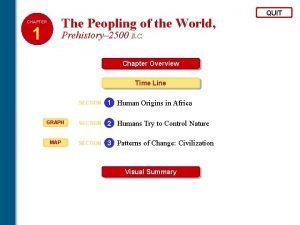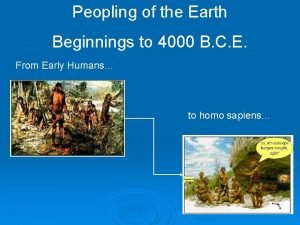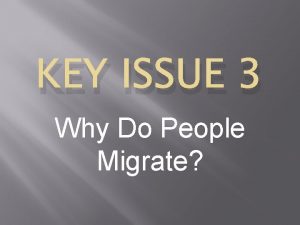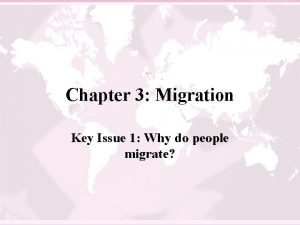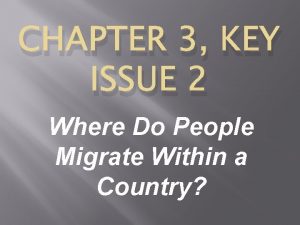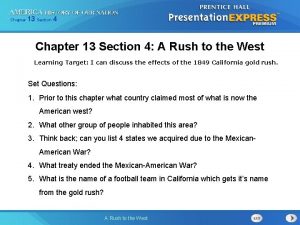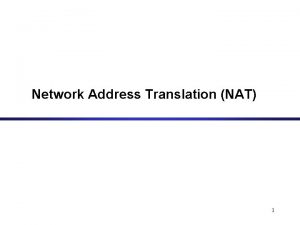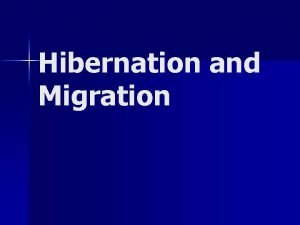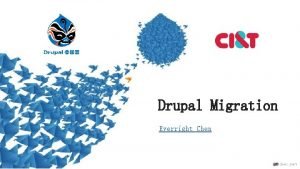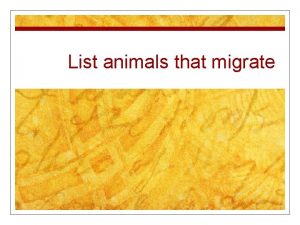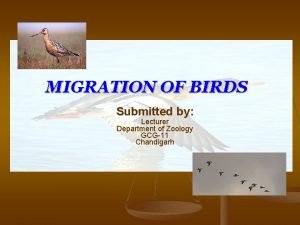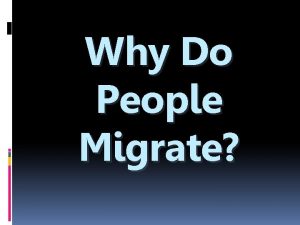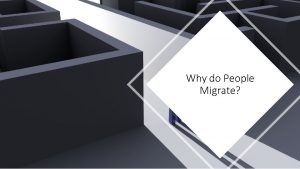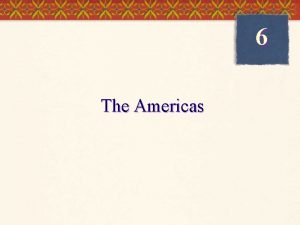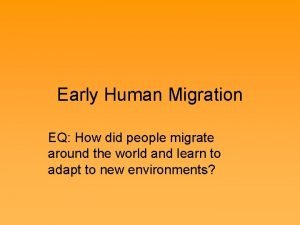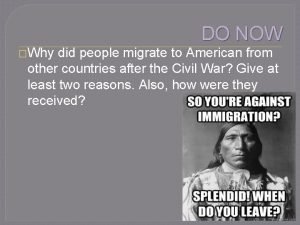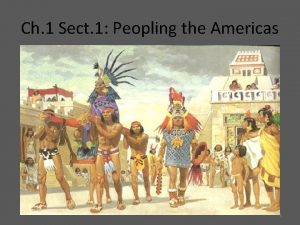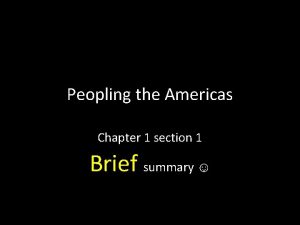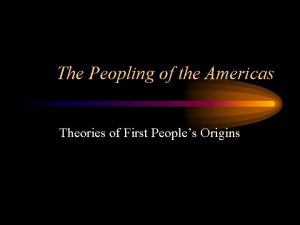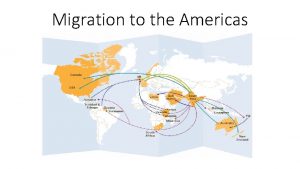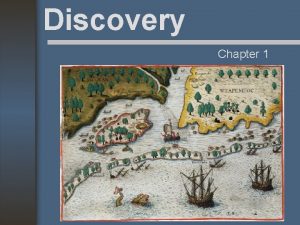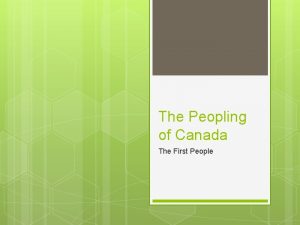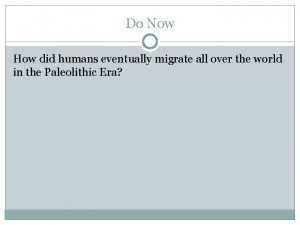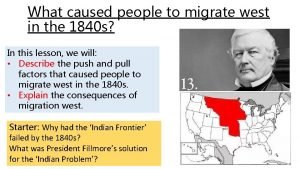Peopling of the Americas How did people migrate



















- Slides: 19

Peopling of the Americas • How did people migrate to the Americas? The Bering Strait = land bridge @40, 000 yrs ago - From N. A. migrated to Central & South Native Americans

Food raised in the Americas • People were able to stay in one location b/c of domestication and surplus What kinds of foods do you notice? CORN = 1 st plant domesticated? What do we use corn for today? Gourds, peppers, beans, pumpkins

• • Early Native Americans Mayans = Guatemala/Yucatan Aztecs = Mexico (Emperor Montezuma) Inca = Peru In North America area: – Hohokam, Anasazi (dry/dessert cliff palace), Adena, Hopewell, Mississippian (Cahokia mound builders) – complex societies • Agricultural Revolution: – Finding ways to cultivate land keep a surplus of crops.

• djd Cohokia = location Illinois represents Mississippian Culture Ansazi pueblo cliff dwelling in Colorado. Dry land. Mesa Verde in CO

Native Americans @ 1400 • Kashaya Pomo: California – Complex instruments to fish & hunt (slingshot) • Kwakiutl (kwakey-ootle): Oregon – Boats, fishing (especially Salmon) – Totems to display family heritage

• Pueblo (Southwest, AZ, NM) – Kiva: ceremonial chambers – Corn, bean, melons, squash – Multi story homes

• Iroquois (Northeast –NY, Great Lakes) – Harsh winters relied on animals for clothing and prepared for long-term conditions


What makes Native American cultures unique? • • • Complex languages Many tribes Traded goods (through barter) Trade routes complex; long distance networks Viewed land use as “source of life” – Not to be traded or sold! – To be used for food gathering & farming (not to be disturbed) – “When we dig roots, we make little holes. When we build houses, we make little holes…. We shake down acorns and pine nuts. We don’t chop down the trees. We use only dead wood [for fires]…. But the white people plow up the ground, pull down the trees, [and the] tree says, “Don’t. I am sore. Don’t hurt me. ” Wintu woman

• Religious Beliefs – Natural world full of spiritual presence – “Creator” “Great Spirit” (many gods/spirits) – Ancestors • Social Organization – Communal – Respect elders, spirits • Elders/Chiefs = authority – Kinship (family ties) Naïve Am. Have clans • Matrilineal (ownership & descent through mother) • Patrilineal ( ownership & descent through father) – Division of Labor (assignment of tasks by age, gender, status): hunted, gathered • Depended on the tribe • Many = egalitarian • Livlihood – Communal, no ownership of land, • HIGHLY COMPLEX SOCIETIES!!

West African Culture • • • Social Organization – Kinship: one’s lineage (common decent, extended family, clan) determined bonds – Akan (Western Africa) = matrilineal • Determined marriage • Elders = respected worked with others make decisions • Division of Labor depended on age & status – Men: hunted & took care of labor – Women: childcare, food preparation, clothing – Some egalitarian Religion – Spirits – Rituals – A variety of gods similar to N. A. – Center = harvest Livelihood – Farming, herding, hunting, fishing – Ownership of land (kept in family or village) – Bartered: plantains, bananas, peanuts, fish/game, fabrics, ceremonial carvings • Demand depended on location: dessert, plains, tropical forest

• Slave Labor – Not born into nor a lifetime – Division of labor, some societies engaged in this – Escape through marriage, or adoption into family they served – Will eventually begin to sell captive slaves to Europeans • Europeans will change the dynamics of slavery when they arrive!

Kingdom of Congo

European Societies • Social Organization: – Hierarchy: people organized by rank & class • Top: Monarchs, nobles, landowners • Bottom: peasants = laborers = majority • How did the two groups interact? - Top provides land & protection to bottom group - Bottom group provides labor & crops § Little to no movement! God’s will! § Artisans and Merchants did by making $$$$ • Family Life • Unlike Native Americans & Africans (kinship not as important) • Focus Nuclear Family: (mom, dad, siblings) • Division of Labor = strong and God’s will • Women = helped men field, children, domestic life • Men = decision makers, political power

• Religion • Christianity • Church played a role in your daily life – Status, instilled fear, • Church had more power than Monarchs • Livlihood – Pre-determined – Take care of your own family

European Crusades • Roman Catholic Church encouraged the spread of Christianity (= salvation) • Islam began to spread, RCC = worried – Wanted to take back territory from Muslims – Crusades (movement to do this in the name of Christianity) armies sent all over to fight • Consequences: – Wealthy people lost $$$ giving others opportunity – The RCC losses power to Monarchies – Pushes monarchs to want to expand explore b/c new products brought back from trading in Asia & other places


Changes in Europe increase desire for expansion • Trade routes throughout Africa/Asia = profitable; desire for new routes increase • Joint-stock companies: Allowed investors pool $$ together. (Investments increase so does capitalism) • Banks emerge • Improved sailing technology & navigation instruments • Population Growth • Rise of Nations: Portugal, Spain, France, England – Monarchs have more power/control • Tax people, build armies, stronger government – need $$ maintain • GOLD & SILVER RUNNING LOW, PUSH FOR EXPANSION TO FIND NATURAL RESOURCES

• k Tea Spices Silk Salted meat (sea salt) Rugs
 Peopling of the world
Peopling of the world The peopling of the world chapter 1
The peopling of the world chapter 1 Where did humans originate
Where did humans originate Immigration v emigration
Immigration v emigration Key issue 3 why do people migrate
Key issue 3 why do people migrate Key issue 3: why do people migrate?
Key issue 3: why do people migrate? Key issue 2: where do people migrate within a country?
Key issue 2: where do people migrate within a country? Why did the mormons migrate to utah
Why did the mormons migrate to utah Chapter 16 people and empires in the americas
Chapter 16 people and empires in the americas Migrate network address translation
Migrate network address translation Do hedgehogs hibernate or migrate
Do hedgehogs hibernate or migrate Azure migrate demo
Azure migrate demo Migrate journal mailbox to office 365
Migrate journal mailbox to office 365 Drupal migrate d2d
Drupal migrate d2d Siebel to salesforce implementation
Siebel to salesforce implementation Norwegians were most likely to migrate to the united states
Norwegians were most likely to migrate to the united states Microsoft virtual academy
Microsoft virtual academy Zugstimmung
Zugstimmung Migrate from customerhub
Migrate from customerhub Why do birds migrate
Why do birds migrate

